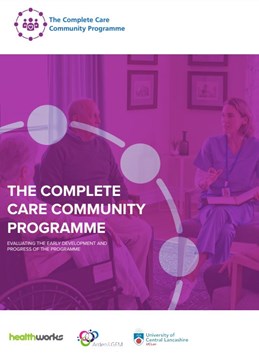The Complete Care Community programme has launched a report evaluating the early development and progress of the programme.
Complete Care Community works with Primary Care Networks across England to identify and address local health inequalities. The programme is delivered by Arden & GEM and Healthworks and receives funding from the National Healthcare Inequalities Improvement Programme, NHS England.
This influential report was produced by the University of Central Lancashire (UCLan) and describes a new approach and methodology that could be adopted by Integrated Care Systems (ICS) to address the challenge of reducing health inequalities in England in a sustainable way.
The report utilises finding from the first 12 months of 26 Complete Care Community ‘demonstrator sites’ spread across three English regions, each involving one or more Primary Care Network (PCN). The programme has now expanded with the support of NHS England to incorporate 46 sites across all seven regions.
This high-quality research aims to deliver relevant, timely and accessible evidence to inform national policy decisions in relation to health inequalities. The ambition is to incorporate more formal research into the Complete Care Community construct and its approach in early 2023.
Leading on the evaluation for this first report, Professor Paul Batchelor, UCLan, added: “We can’t simply keep trying harder at what has already failed. We need to find out why the NHS in general has found it so hard to manage complex care in disadvantaged groups and reduce health inequalities. Our first evaluation of the programme is starting to find some of the answers and our further research we hope will be able to provide the evidence to take a new approach.”
“Tackling health inequalities is a key focus for NHS recovery from the COVID-19 pandemic, and a high priority for newly established ICSs, but to achieve lasting change, effective ways which address health inequalities need to be much more transferrable and sustainable. Our approach uses demonstrator sites with unique characteristics but which share one purpose - which is to reduce fragmentations in service delivery by aligning efforts to foster both comprehensiveness of care and health promotion interventions in their respective communities.”
The full report can be viewed here.

